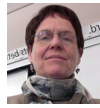Notes from Summer Conferences: Revamping the AP Course Curricula and a CETE Initiative to Encourage More Students into STEM Fields
From Reen Gibb
 I have recently participated in two educational conferences focused on strengthening STEM education I have recently participated in two educational conferences focused on strengthening STEM education
in the U.S.
- The CollegeBoard is revamping all the AP course curricula and AP tests, and I’ve worked with the redesign of the chemistry curriculum. This revamping has been a 10-year project and has gone through many iterations. In the sciences the objective is to engage students in the “practice of science by enabling them to develop questions and hypotheses, and then design experiments providing evidence and explanations; and provide students with advanced inquiry and reasoning skills that will prepare them for the study of advanced scientific topics.” In addition, there is a strong focus on access for all students to an excellent education and the need for pre-AP programs that provide students with the basic skills so they can be successful in an AP program. In other words, there should be no gates to keep students out of AP courses.
This new AP focus is on doing science and thinking like a scientist. Instead of memorizing facts, the student is given facts/data and asked to apply them appropriately in novel situations. We, the AP consultants, have been trained to conduct workshops to teach chemistry teachers how to conduct inquiry-based labs starting this fall. The focus is to move teachers from the ‘cookbook fill in the blank type’ lab to a lab where students develop a concept. The student designs the question, procedure, data table and draws conclusions based on the evidence. In 2014, the AP chemistry exam will reflect these changes.
- CETE (Consortium for Excellence in Teacher Education) is a consortium of private, selective liberal arts colleges located in the Northeast. They have begun an initiative to find ways to increase the number of undergraduates entering STEM fields at their respective institutions. Their first conference with representatives from each institution and three HS teachers was held at Bryn Mawr College. The majority of the meeting was spent describing the challenges in getting and keeping students in the STEM fields. The importance of a quality STEM K-12 education was stressed as a necessary precursor to choosing STEM courses at the college level.
John Ewing of Math for America was a featured speaker. He addressed the following: value added test scores do not hold up under scrutiny and are a hoax; the public needs to change its perception of education as being easy and frivolous; learning is complex, long term and cannot be assessed by test scores alone; teaching is not attractive if all the focus is on raising test scores; teacher training needs to be revamped. Maria Rivera-Maulucci, Assistant Professor of Education at Barnard College, was the other featured speaker who addressed the topic of how and why we lose many students from the STEM fields. She stressed the importance of attracting and supporting under represented groups and changing the “boring, gate keeper” freshman/sophomore science courses. Other challenges: how do we get students to master the necessary math skills, work harder and accept lower GPA’s than their humanity major counterparts.
Both the AP exam redesign and the CETE initiative require even more of science and math teachers. In schools today, the nonteaching demands on teachers have increased, resources are more limited, there is a huge focus on student test results and the new teacher evaluation process is time consuming and I believe flawed. The accountability and assessment (testing) mania that is sweeping K-12 education is a time, money and energy-draining parasite. It does not prepare students for life, drives teachers out of the profession, reduces the joy of learning, stifles curiosity and creativity. Teachers are burning out faster than ever, and students are tuning out.
What do we do to make public schools a place where teachers want to stay and where students want to learn?? If what we want is to provide a world class STEM education, then a top priority must be to find and retain talented teachers. There will have to be an increase in funding. Technology and online resources are powerful and underutilized tools. There is so much out there on the Internet, but this resource needs to be streamlined, and any vetted programs must be singled out.
In 1983 the report A Nation at Risk was published. We are more than ever a nation at risk. It is imperative that we educate our students so they are able fill the jobs that will exist in the future.
Reen Gibb is a Chemistry Teacher at Westwood High School in Westwood, Massachusetts. She also works at MIT to train students who will become high school science teachers.
Back to newsletter |